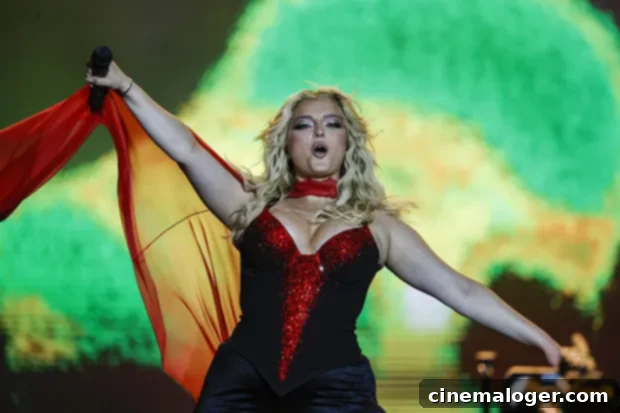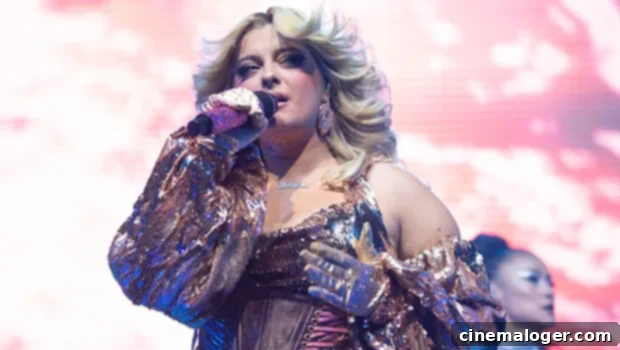Bebe Rexha’s VMA Anxiety: A Candid Look at Body Image, Mental Health, and Celebrity Pressure
Pop sensation Bebe Rexha, known for her chart-topping hit “I’m Good (Blue)” with David Guetta, recently shared a deeply personal and vulnerable message with her fans, revealing her profound anxiety about attending the 2023 MTV Video Music Awards (VMAs). In a candid TikTok video posted on Monday, September 11, the 34-year-old singer admitted to not feeling like herself, sparking an important conversation about body image, mental health, and the immense pressures faced by public figures.
The “I’m Good” popstar, whose collaboration with David Guetta earned her a coveted nomination for Best Collaboration, confessed her hesitations just a day before the prestigious event. “The VMAs are tomorrow, and I am anxious AF,” she began in the emotional clip, her honesty immediately resonating with millions. This raw admission laid bare the often-hidden struggles behind the glitz and glamour of celebrity life, reminding us that even the most successful artists contend with universal human emotions.
The Weight of Public Scrutiny: Bebe Rexha’s Battle with Insecurity
Despite her immense gratitude for the nomination and the opportunity to perform, Bebe Rexha openly confessed her insecurities, particularly regarding public commentary on her weight. “I know that the criticism comes with the territory. Sometimes it does get to me. I am human,” she stated, emphasizing the deeply personal impact of such remarks. Her words highlight a pervasive issue in the entertainment industry, where celebrities, especially women, are constantly subjected to intense scrutiny over their physical appearance.
The thought of walking the red carpet, a moment typically associated with celebration and confidence, filled her with dread. “Right now, I’m not feeling so confident. I am so anxious and stressed about going on the red carpet, and I guess people talking about my weight, because I’m not really loving myself right now. I’m not really feeling like the bad b***h that I usually am,” she revealed. This striking contrast between her public persona, often exuding power and self-assurance, and her private feelings of vulnerability, underscores the immense emotional labor involved in maintaining a public image.
Bebe’s courage in sharing these feelings offers a powerful counter-narrative to the often-perfected facades seen on social media and in mainstream media. It normalizes the experience of anxiety and self-doubt, even for those at the pinnacle of their careers. Her willingness to discuss her struggles with self-love in the public eye serves as a vital reminder that mental health and body image issues affect everyone, regardless of their status.
@beberexha Anxiety sucks
♬ original sound – BebeRexha
“I’m Good (Blue)”: A Global Success Amplifying the Spotlight
The irony of Bebe Rexha’s situation is palpable. Her song “I’m Good (Blue)” with David Guetta has been a monumental success, dominating charts worldwide and becoming a ubiquitous anthem across various platforms. Its infectious beat and uplifting lyrics have resonated with millions, cementing Rexha’s status as a global pop icon. A VMA nomination for such a widely acclaimed track is a testament to her talent and the song’s cultural impact.
However, this very success, while celebratory, also brings with it an intensified spotlight. Every achievement, every appearance, is magnified, leading to increased public scrutiny. For an artist already grappling with personal insecurities, this heightened attention can feel overwhelming, transforming what should be a moment of triumph into a source of immense pressure. The expectation to appear flawless, especially at high-profile events like the VMAs, creates an environment where body image concerns can escalate dramatically.
The music industry often celebrates a certain aesthetic, and artists, particularly women, frequently find themselves under the microscope for their physical appearance as much as for their musical talent. This relentless focus on external beauty can overshadow an artist’s genuine accomplishments and contribute significantly to mental health challenges.
A Call for Solidarity: Bebe Rexha Seeks Motivational Tips from Fans
In a powerful display of vulnerability, Bebe Rexha reached out directly to her fans, asking for their methods in dealing with anxiety. “I guess everybody has these days, and nobody ever feels perfect, and that’s why I wanted to make this video,” she explained. Her raw honesty cultivated an immediate sense of community, transforming a personal struggle into a shared experience.
She revealed that she had an outfit ready, a “cute” dress she genuinely wanted to wear to celebrate her and her friends’ nominations. Yet, the grip of anxiety was strong. “If you have any motivational tips or tricks, please share them with me. I genuinely want to know, and maybe you’ll see me on the red carpet tomorrow,” she pleaded, demonstrating immense courage by admitting she needed help. This interaction highlights the unique and often therapeutic relationship between artists and their fan base, where genuine connection can offer solace and support.
Bebe’s openness encourages a broader dialogue about mental health, particularly the often-stigmatized topic of anxiety. By asking for practical advice, she not only sought personal relief but also created a space for her followers to share their own coping mechanisms, fostering a sense of collective understanding and mutual support. This proactive approach to mental well-being serves as an inspiration for many who may be facing similar silent battles.

Bebe Rexha’s Consistent Advocacy for Body Positivity
This isn’t the first time Bebe Rexha has candidly addressed the issue of body shaming and weight criticism. She has been a vocal advocate for body positivity and self-acceptance, often using her platform to challenge unrealistic beauty standards and promote a healthier outlook on body image. Her consistent messaging underscores her commitment to destigmatizing conversations around physical appearance and mental health.
In April, she notably clapped back at online trolls who commented on her weight. She expressed her frustration and hurt when she saw that “weight gain” appeared as a suggested search term alongside her name on TikTok. “Seeing that search bar is so upsetting. I’m not mad because it’s true. I did gain weight. But it just sucks. Thank you to all the people who love me no matter what,” she wrote then. This earlier statement demonstrated her resilience and her unwavering stance against body shaming, while also acknowledging the pain it causes.
Her ongoing transparency is crucial in an industry that often promotes an unattainable ideal. By speaking out, Bebe Rexha empowers countless individuals, particularly her younger fans, to embrace their bodies and prioritize their mental well-being over societal expectations. Her journey, marked by both incredible success and personal struggles, paints a more realistic and relatable picture of life in the public eye, fostering a more empathetic and understanding fan base.
Navigating the VMAs: Beyond the Red Carpet
The MTV Video Music Awards are more than just an awards ceremony; they are a cultural spectacle known for their iconic fashion moments, groundbreaking performances, and often controversial celebrity appearances. For artists, attending the VMAs means not only celebrating their work but also navigating an intense media landscape where every outfit choice, every facial expression, and every body movement is scrutinized and dissected.
For someone like Bebe Rexha, who has openly shared her anxieties about body image, the VMA red carpet transforms into a gauntlet of judgment. The pressure to look “perfect” is immense, and any deviation from perceived norms can lead to a barrage of negative comments online. This environment, while thrilling for many, can be incredibly taxing on an individual’s mental health, making the decision to attend a complex one.
Bebe’s internal conflict — wanting to celebrate her achievements and support her friends, yet battling overwhelming anxiety — highlights a fundamental tension for many public figures. It’s a constant negotiation between professional obligations and personal well-being. Her willingness to articulate this struggle provides valuable insight into the emotional cost of fame and reminds us that behind every glamorous facade, there’s a human being with real feelings and vulnerabilities.
The Power of Vulnerability and the Path to Self-Acceptance
Bebe Rexha’s TikTok video is a testament to the power of vulnerability. In a world saturated with curated perfection, her unfiltered honesty stands out as a beacon of authenticity. By sharing her anxieties, she not only sought support but also inadvertently offered a form of therapy to countless others who grapple with similar feelings of insecurity and self-doubt.
Her experience underscores the importance of a compassionate approach to celebrity culture. Instead of dissecting and critiquing, fans and media alike can choose to engage with empathy and support. Her call for motivational tips is a powerful invitation for collective encouragement, demonstrating that even pop stars can benefit from the wisdom and kindness of their community.
Ultimately, Bebe Rexha’s journey, whether she decided to grace the VMA red carpet or not, is a powerful narrative about self-acceptance. It’s a continuous process, fraught with challenges, especially when under constant public scrutiny. Her bravery in opening up contributes significantly to the ongoing global conversation about mental health and body positivity, advocating for a more understanding and supportive environment for everyone. Her message resonates: prioritizing mental well-being and practicing self-love are essential, no matter who you are or what pressures you face.
